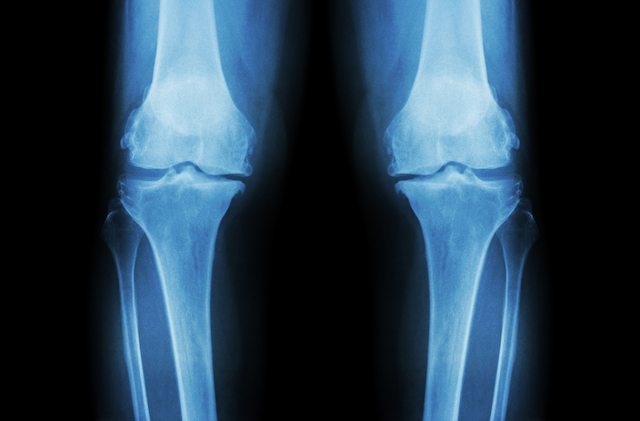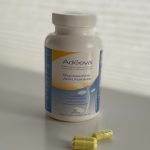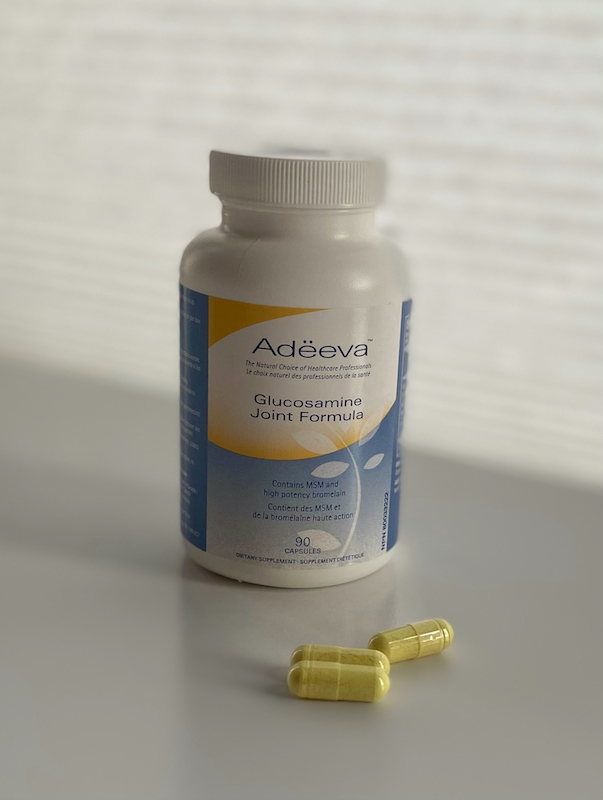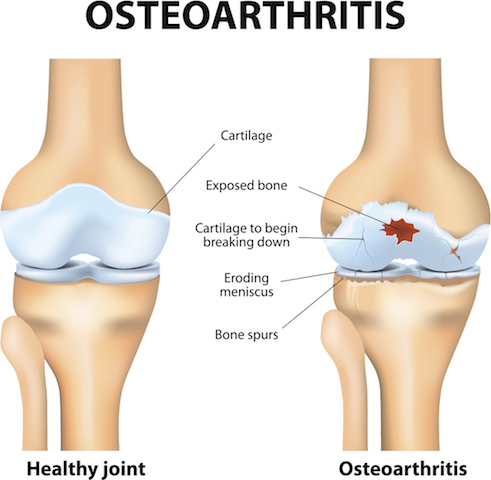Estimated reading time: 6 minutes
If you have been diagnosed with osteoarthritis you are likely struggling with something like knee, hip or low back pain. In addition, you have been prescribed anti-inflammatories like Advil or Ibuprofen for pain relief. Although you may have had some success with these drugs in controlling pain, you’re concerned about their side effects. In contrast, there are natural supplements that can provide significant pain relief and are safer than medications. For example, glucosamine sulphate for osteoarthritis pain relief can provide a safer and more effective solution than medications. In this post, I will discuss what osteoarthritis is, how glucosamine sulphate works, and how to supplement with glucosamine sulphate.
What is Osteoarthritis?
Osteoarthritis is a condition you can develop where your joints wear out and they become painful and swollen. As result, osteoarthritis limits your mobility and the activities you enjoy.

Risk Factors for Osteoarthritis
Osteoarthritis is a common condition that affects millions of people worldwide, and it can cause significant discomfort and pain. Here are the main risk factors for osteoarthritis:
- Joint misalignments and poor posture leads to extra stress on your joints which will speed up the osteoarthritis process. (1)
- Injury from a fall or a sports injury to one or many of your joints. (2)
- Being overweight or obese also leads to extra stress on your joints. (1)
- Too much exercise over a long period of time will put too much stress on your joints. (3) As well, not getting enough rest in between exercise leads to poor recovery and poor healing of damaged joints.
- Conversely, not getting enough exercise throughout your day seizes your joints up over time. Movement keeps your joints mobile and lubricated or “well-oiled”. (4, 5)
- Hypothalamic-Pituitary-Adrenal axis Dysregulation (HPA-D) involves the inability of your brain and nervous system to control and balance your levels of stress hormones like cortisol. Cortisol has many functions including making you more alert and decreasing inflammation. If cortisol fails to function, inflammation and joint pain can persist. (6) HPA-D is caused by the following:
- prolonged perceived mental stress
- prolonged lack of sleep
- food intolerances
- blood sugar problems
- gut or digestive problems
- any condition that causes chronic inflammation
- Although genetics and getting older certainly play a part in getting osteoarthritis, it is the above factors that create osteoarthritis for the most part.
How does glucosamine sulphate for osteoarthritis work?
Glucosamine is a natural compound made in the body, and it plays a vital role in maintaining the health of the cartilage. Glucosamine sulphate supplements provide the body with extra glucosamine, which can help support the repair and maintenance of cartilage to: (1, 7, 8)
- reduce pain,
- improves function/mobility of the joint
- reduce osteoarthritis progression
- reduce the risk of total joint replacement
Glucosamine sulphate supplements help support the repair and maintenance of cartilage to reduce pain, improve joint mobility, reduce the progression of osteoarthritis, and reduce the risk of total joint replacement.
There are some studies that show glucosamine sulphate is effective for osteoarthritis and some studies that show glucosamine sulphate is not effective for osteoarthritis. (1, 9) With human studies this gets even more complex as there are many variables that can affect outcomes. For example, if you are overweight, inactive, and eat a lot of refined flours (bread, pastries, cereal, pasta, pizza, beer) and refined sugars, taking a glucosamine sulphate supplement will probably be less effective.
If you are overweight, inactive, and eat a lot of refined flours (bread, pastries, cereal, pasta, pizza, beer) and refined sugars, taking a glucosamine sulphate supplement will probably be less effective.
Glucosamine Sulphate for Osteoarthritis: Dosage
The recommended dosage for glucosamine sulphate supplements varies depending on the product and the individual’s needs. It is essential to follow the instructions on the supplement label and to consult with a healthcare professional before starting any new supplements.
Most research shows taking a dosage of 1500 mg/day was more effective and safer than using NSAIDs. (1) If you weight more than 200 pounds I would recommend you take 2000 mg/day.
As well, even if you haven’t been diagnosed with osteoarthritis, I would advise that you take it after the age of 40. The reason for this is as we age, your ability to repair and regenerate cartilage decreases. (10) So even taking 500 mg/day of glucosamine sulphate can help with that process.
The positive effects of taking a glucosamine sulphate supplement can take up to 12 weeks before you notice improvements in stiffness, pain, and swelling.
I have recommended the following glucosamine sulphate formula made by Adeeva for years:
- Glucosamine Sulfate 1500 mg
- MSM (Methyl Sulfonyl Methane) 400 mg
- Quercetin 300mg
- Bromelain Enzymes (2,400 GDU) 300 mg
The last three ingredients are natural anti-inflammatories that help with pain reduction. You can order this online or if you’re a patient of Dr. Collins you can buy it at his office.
If you prefer a different brand, make sure you get a high quality supplement that is 3rd party tested, GMO(genetically modified organism) free, food intolerance free, and chemical free so you can be assured you are getting what you pay for. You will usually find this grade of supplement when you by from a health food store or a registered health professional.
Glucosamine Sulphate for Osteoarthritis: Safety
You should avoid taking glucosamine sulphate if you are pregnant or breastfeeding.
If you have the following conditions or circumstances you should have your MD monitor your tolerance to this supplement:
- Diabetes
- Taking insulin
- High blood pressure
You need approval to take this supplement from your specialist if you have the following conditions or circumstances:
- Kidney failure
- Kidney disease
- Liver problems
- Organ transplants
- Chemotherapy or radiation therapy
Some of my patients say they can not take glucosamine sulphate because they are allergic to shellfish. Although glucosamine sulphate is made from the shells of shellfish, it has been shown not to contain protein in it that one may be allergic to. So there are individuals who have known shellfish allergies take glucosamine without any allergic reactions. In saying that, there are anecdotal reports of people having allergic reactions. There have been no life threatening reports, and no warnings from Health Canada or the US FDA. Therefore, practitioners should monitor patient tolerance to glucosamine or avoid it all together based on the severity of the reaction.
Summary
Glucosamine sulphate is a promising supplement for managing osteoarthritis symptoms. Pain relief, increased mobility, avoiding a knee or hip replacement, and carrying on with the activities you enjoy are all good reasons to take glucosamine sulphate on a regular basis. However, it is important to consult with a healthcare professional before starting any new supplements. By working with a healthcare professional and incorporating healthy habits into your lifestyle, you can find relief from osteoarthritis symptoms and maintain good joint health.
For more information on how chiropractic care can help you and your family read Dr. Collins’ complete guide to chiropractic care called Chiropractic Care for Everyone.




Leave a Reply